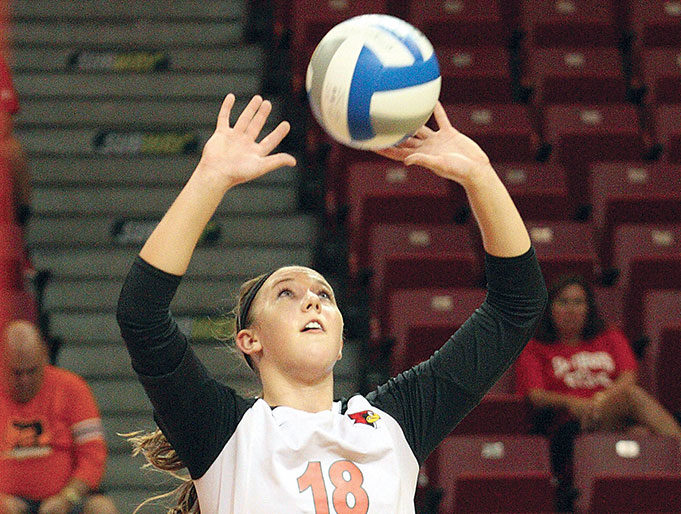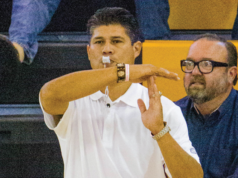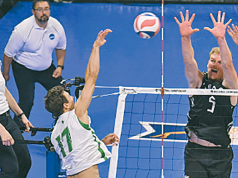We have all made mistakes, there are plenty of reasons why, but officials can’t compound missed calls with phantom calls.
It can happen with ballhandling. Maybe your mind wandered momentarily, and you lost focus, or you were distracted for a split second and took your eye off the ball. The bench erupts, you hear the spectators booing and you wonder what you just missed. And of course, the ball looks like it is in a tornado, but you have no idea whether it was played with one hand, two hands, a forearm pass or a foot dig.
How about a net fault? You’re in transition during a rally. You get to your position on the blockers’ side of the net and you see the net bouncing all over the place. Here comes the opposing coach yelling that the other team was in the net. You have no idea if someone was in the net or whether the ball might have hit the net and caused the net to bounce.
Touches, especially off the blocker’s fingertips, can be missed, too. Of course, the attacking team is begging for the touch. Sometimes it is just that, begging to get the call in its favor. Other times you can feel it in your gut that the ball may have been touched, and you scan your crew looking for information, but no one has anything other than “out.”
It can happen with a pancake play, too. You are not sure whether the ball hit the floor or whether the player got his or her hand underneath it. Neither the line judges nor your partner are giving you a signal, so you let play continue. And in the meantime, the opposing coach is yelling that the ball was down.
In any of those cases, you are probably kicking yourself because you feel you missed a call. Or at a minimum, you didn’t see what happened, so you aren’t sure whether there really was a fault or not. And you’re kicking yourself for that too because you feel you should have seen the play. But don’t kick yourself Especially with touches and line calls, we need to recognize that the speed of the ball is sometimes faster than the human eye can process. But we still should challenge ourselves to see the play and get the call right.
Take into consideration, too, that angles play a big role in your decision-making process. Your angle from the stand or floor is just that — your angle. That does not mean it was the best angle, but it is the angle you must work with. There’s no guarantee that you’ll have an unobstructed view of every play.
Conversely, have you ever made a call that in retrospect, you aren’t 100 percent sure was a fault? When you’re so intensely focused on the match that you’re “looking” for faults, sometimes you get a little anxious with your whistle. In a competitive, high-pressure match, your intensity can sometimes rise with the emotions of the match, and that can also put your nerves — and your whistle — on edge.
When you just got some grief for a no-call on a touch, a net contact or ballhandling, it can make you hypersensitive when the next similar play happens. You end up blowing your whistle so that you aren’t guilty of missing another one. You try to sell the call, but maybe your whistle was a little too quick and the call was a little too tight. Deep inside you’re wishing you hadn’t pulled the trigger.
Sometimes in your effort to recover after a challenging situation, you try to jump back into the match with zeal and extra focus. You don’t want to miss a thing. And in that endeavor, you start making calls that you normally wouldn’t make.
So, which one is worse? Missing a fault that might have occurred or calling a fault that didn’t happen? Hopefully the answer is clear. Since a big part of an official’s job is to call faults, whistling something that didn’t happen is the least desirable of the two. Coaches are more likely to be forgiving when a call is missed than they are when you call a fault that didn’t occur.
At all levels in volleyball, officials are trained to be certain that a fault has occurred before blowing the whistle — 100 percent certain. That means, when there’s doubt, play should continue. That is the best way to establish consistency. In the process, yes, a call may be missed on occasion, but we’re human. And if the missed calls are not a common occurrence, everyone learns to live with it.
If we were to ask coaches whether they would rather have us miss a call, or whether they would be OK with us calling a fault or two that didn’t happen, it seems obvious that they would rather have us miss a call. Missing a call is the lesser of two evils. At least in the case of a missed call during play, the rally would continue, and their team would still have an opportunity to win the point. But if we kill the play with a whistle when we are not 100 percent certain a fault occurred, we’re taking away the team’s chance to win the rally outright.
With that philosophy in mind, it surely does not mean that it is OK to miss calls on a regular basis. Nor does it mean that it is OK to not whistle anything. Instead, it recognizes the fact there are acceptable misses, faults that we just did not see, despite our best effort. And we need to keep those acceptable misses to a minimum while acknowledging that they are part of the game.
We are trained professionals. There are decisions to be made during every rally, and we use our training and experience to make those decisions. Our goals should be to get a vast majority of the calls right and to learn from the ones that we miss.
You are going to miss calls despite your best preparation, effort and focus. And if you are going to miss a call, it is probably better to miss something that may have happened, like a touch, then to call a fault that did not happen at all. When you make up a call when there was none to be made, your credibility is at risk.
What's Your Call? Leave a Comment:
Note: This article is archival in nature. Rules, interpretations, mechanics, philosophies and other information may or may not be correct for the current year.
This article is the copyright of ©Referee Enterprises, Inc., and may not be republished in whole or in part online, in print or in any capacity without expressed written permission from Referee. The article is made available for educational use by individuals.


















